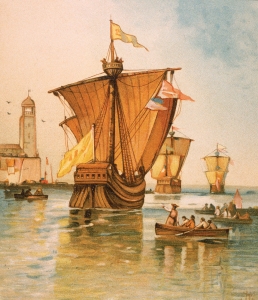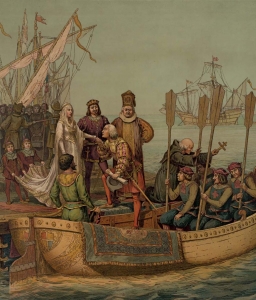Modern anti-history portrayals of Columbus enjoy ridiculing him as some sort of first-rate bumbling fool. It simply is definitive, “proof that Columbus was an idiot if he still thought they were in the Indies.”1 Come on, seriously, who in their right mind would mistake America for India? That’s what maps are for! I mean, they aren’t even close to each other. Who but a dunce of the highest order would miscalculate the circumference of the globe because he mistook calculations done in Arabic miles for those done in Roman miles instead.2 That’s just ridiculous!
But nevertheless, people who are neither sailors nor historians, have come to the stunning conclusion that the man formally named Admiral of the Ocean Sea was a “stubborn idiot” and a “cruel-hearted simpleton,”3 taking to calling him school-yard names like “Chuckle-Headed Columbus.” 4
Anti-Columbus activists declare without hesitation that Columbus, a figure respected for over 400 years:
Is the perfect American. He was loud, ignorant, greedy and evil, and his intolerance was fueled by his religious extremism. His life’s work was stealing wealth, bamboozling the government, and crushing the little people—whether his own shipmates or the Caribbean natives.5
 Furthermore, these personal attacks now extend to anyone who might think the historical record tells a different story—certainly no one must examine the evidence or facts and draw a conclusion other than the one they reached. Defenders of Columbus are deemed, “just as idiotic and disgusting as he was,” because who but a bigot would suggest Columbus was anything but a, “half-wit harbinger of genocidal calamity.”6
Furthermore, these personal attacks now extend to anyone who might think the historical record tells a different story—certainly no one must examine the evidence or facts and draw a conclusion other than the one they reached. Defenders of Columbus are deemed, “just as idiotic and disgusting as he was,” because who but a bigot would suggest Columbus was anything but a, “half-wit harbinger of genocidal calamity.”6
However, for hundreds of years previous to the 1970’s (when much of the modern anti-Columbus sentiment took root) Columbus was constantly held in the highest regard as a sailor, navigator, and explorer. The main argument offered for Columbus’s lack of intelligence comes from the fact that he didn’t make it to India but instead discovered an entire world unknown to anyone except those who lived there. It seems odd that someone’s credentials would be attacked because they encountered something which literally no one knew existed, so let’s examine what kind of credentials Columbus had.
Christopher Columbus was not born into money or nobility. His father was a lower-class tradesman and nascent entrepreneur who worked extremely hard to give his children at least the basic fundamentals of education. Through his father’s efforts and a few wealthier friends who assisted him with the studies, Columbus learned to read at a young age—a remarkable feat for this era of widespread illiteracy. From this point on Columbus educated himself through constantly learning new skills and reading extensively in math and science specifically.
Columbus himself, realizing that his self-education might be used against him by academics who considered knowledge something only held by them alone, took time to relate his extensive experience to King Ferdinand and Queen Isabella. The Admiral explains that:
At a very early age I went to sea and have continued navigating until today. The art of sailing is favorable for anyone who wants to pursue knowledge of this world’s secrets. I have already been at this business for forty years. I have sailed all the waters which, up to now, have been navigated. I have had dealings and conversation with learned people—clergymen and laymen, Latins and Greeks, Jews and Moors, and with many others of other sects. I found Our Lord very well-disposed toward this my desire, and he gave me the spirit of intelligence for it. He prospered me in seamanship and supplied me with the necessary tools of astrology, as well as geometry and arithmetic and ingenuity of intellect and of manual skill to draw spherical maps which show cities, rivers and mountains, islands and ports—everything in its proper place.7
This could seem like a high boast if he was a bad sailor, but by all accounts, he quite probably undersells his ability as a navigator out of humility. In fact, one of the crew members on the second voyage to the New World took time to specifically note Columbus’s exceptional skill on the water:
But there is one thing that I wish you to know, that, in my humble opinion, since Genoa was Genoa, no other man has been born so magnanimous and so keen in practical navigation as the above-mentioned Lord Admiral; for, when navigating, only by looking at a cloud or by night at a star, he knew what was going to happen and whether there would be foul weather; he himself both conned and steered at the helm; and when the storm had passed over, he hoisted sail while the others were sleeping.8
And this evaluation of Columbus’s exemplary skill as a sailor (hoisting sail single handed is no small feat) and a navigator is by no means restricted to just those who sailed with him. Even the Pope took time to publicly praise, “our beloved son Christopher Columbus,” and his, “the utmost diligence sailing in the ocean sea, through western waters.”9 From big to small, everyone acknowledged his skill at the helm.
Over 400 years after Columbus’s voyages, renowned naval historian Samuel Eliot Morison led the Harvard Columbus Expedition in 1939 while writing one of the most complete accounts of Columbus ever executed. From Columbus’s journals and other primary source documents, Morison and his crew traced Columbus’s path through the ocean and around the Caribbean. At the end of their journey, Morison concluded that:
The voyage that took him to “The Indies” and home was no blind chance, but the creation of his own brain and soul, long studied, carefully planned, repeatedly urged on indifferent princes, and carried through by virtue of his courage, sea-knowledge and indomitable will. No later voyage could ever have such spectacular results, and Columbus’s fame would have been secure had he retired from the sea in 1493. Yet a lofty ambition to explore further, to organize the territories won for Castile, and to complete the circuit of the globe, sent him thrice more to America. These voyages, even more than the first, proved him to be the greatest navigator of his age, and enabled him to train the captains and pilots who were to display the banners of Spain off every American cape and island between Fifty North and Fifty South. The ease with which he dissipated the unknown terrors of the Ocean, the skill with which he found his way out and home, again and again, led thousands of men from every Western European nation into maritime adventure and exploration.10
 Even if you disagree with what Columbus was attempting to do, you cannot deny the fact that he was an outstandingly intelligent navigator—the best of his age. On top of that, his technical, scientific, and astrological knowledge rivaled, if not exceeded, that of many formally training “intellectuals” of his day.
Even if you disagree with what Columbus was attempting to do, you cannot deny the fact that he was an outstandingly intelligent navigator—the best of his age. On top of that, his technical, scientific, and astrological knowledge rivaled, if not exceeded, that of many formally training “intellectuals” of his day.
The Founding Fathers recognized that fact to the extent that often America was called Columbia in the poetry of people like Phillis Wheatley11 and Joseph Hopkinson in the famous song Hail Columbia.12 John Adams recognized that Columbus was, “a bold navigator & successful adventurer.,”13 while Thomas Jefferson scoured Europe for an accurate portrait of the Admiral going so far as to study which paintings bore the closest resemblance to Columbus.14 While president, George Washington spent time going to the theater to watch a play detailing the landing of Columbus.15 Others went so far as to say that he stands as the “type of the American character.”16
Beyond the personal acknowledgements from the various Founding Fathers, the culture as a whole so respected Columbus’s skill and importance as a sailor and explorer that one of the first ships in the United States Navy was the USS Columbus17 while the newly designed capitol was christened in his honor.18 So, very far from the idiot he is often portrayed as today, for over 400 years, people of science, of stature, and even entire nations understood that Christopher Columbus was a brave explorer who expanded the realms of human knowledge and understanding.
Endnotes
1 Seth Michels, “History Uncensored Ep. 6 Columbus the Idiot Part 2,” History Uncensored Podcast (July 9, 2019), here
2 Samuel Morrison, Admiral of the Ocean Sea (New York: MJF Books, 1970), 65.
3 Ken Layne, “Today We Honor Columbus, An Inspiration to Cruel Half-Wits Everywhere,” Gawker (October 14, 2013), here.
4 Seth Michels, “History Uncensored Ep. 6 Columbus the Idiot Part 2,” History Uncensored Podcast (July 9, 2019), here
5 Ken Layne, “Today We Honor Columbus, An Inspiration to Cruel Half-Wits Everywhere,” Gawker (October 14, 2013), here.
6 Rafi Schwartz, “These Defenses of Columbus Day Are Just as Idiotic and Disgusting as He Was,” Splinter (October 9, 2017), here
7 Christopher Columbus, “Letter from the Admiral to the King and Queen,” Christopher Columbus’s Book of Prophecies, trans. Kay Brigham (Fort Lauderdale: CLIE Publishers, 1992), 178.
8 Michele de Cuneo, “Michele de Cuneo’s Letter on the Second Voyage, 28 October 1495,” Journals and Other Documents on the Life and Voyages of Christopher Columbus, trans. Samuel Morrison (New York: Heritage Press, 1963), 227.
9 Alexander VI, “The Bull Inter Caetera. May 3, 1493,” European Treaties Bearing on the History of the United States and its Dependencies to 1648, edited by Frances Gardiner Davenport (Washington DC: Carnegie Institution of Washington, 1917), 61-62.
10 Samuel Morrison, Admiral of the Ocean Sea (New York: MJF Books, 1970), p. 669.
11 Phillis Wheatley, “To His Excellency, George Washington” Phillis Wheatley Historical Society (accessed August 20, 2019), here
12 Joseph Hopkinson, “Hail Columbia,” Bartleby (accessed August 20, 2019), here
13 John Adams to William Tudor, Sr., February 25, 1800, Founders Online (accessed August 16, 2019), here.
14 Thomas Jefferson, “Notes on the Likeness of Christopher Columbus, 28 August 1814,” Founders Online (accessed August 20, 2019), here
15 George Washington, “Diary Entry: 6 February 1797,” Founders Online (accessed August 20, 2019), here
16 Charles Ingersoll, “Proceedings at Philadelphia: The Triumph of Patriotism,” ed. Hezekiah Niles, The Weekly Register (Baltimore: The Franklin Press, 1812), 2:203, here.
17 John Adams, “Autobiography: In Congress, November and December 1775,” Founders Online (accessed August 20, 2019), here
18 Thomas Jefferson to George Washington, September 8, 1791, Founders Archive (accessed August 20, 2019), here
Still looking for answers? Visit our FAQ page
More Resources
Know the Truth and Protect Your Freedoms.
Still looking for answers? Visit our FAQ page
Stay Informed with the Latest Resources
Enter your email address to receive our regular newsletter, with important information and updates right in your inbox!










